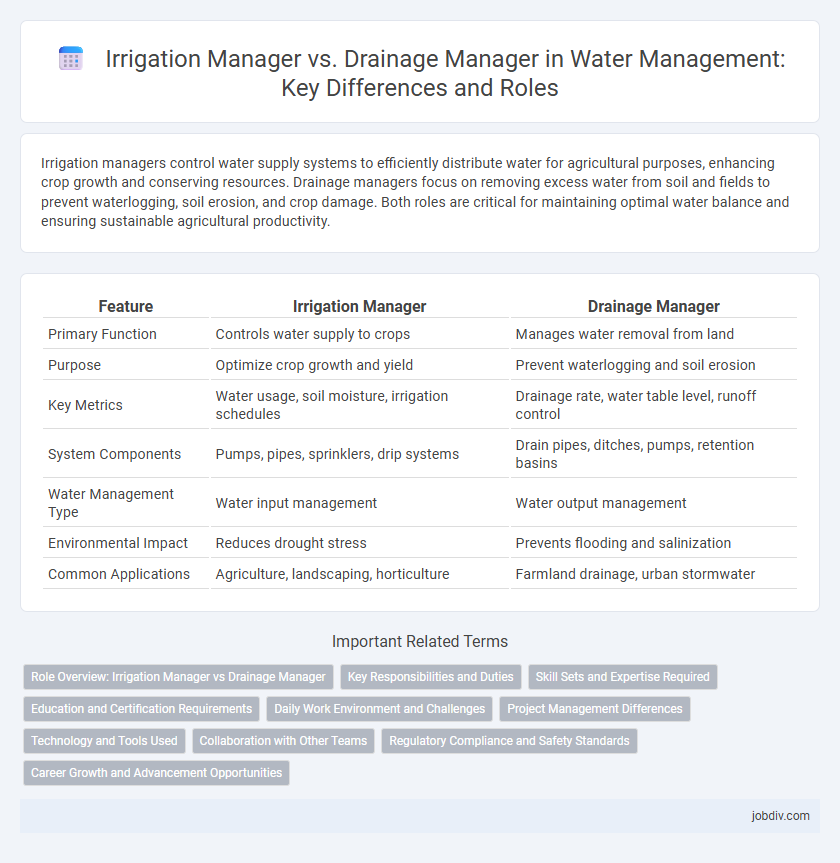Irrigation managers control water supply systems to efficiently distribute water for agricultural purposes, enhancing crop growth and conserving resources. Drainage managers focus on removing excess water from soil and fields to prevent waterlogging, soil erosion, and crop damage. Both roles are critical for maintaining optimal water balance and ensuring sustainable agricultural productivity.
Table of Comparison
| Feature | Irrigation Manager | Drainage Manager |
|---|---|---|
| Primary Function | Controls water supply to crops | Manages water removal from land |
| Purpose | Optimize crop growth and yield | Prevent waterlogging and soil erosion |
| Key Metrics | Water usage, soil moisture, irrigation schedules | Drainage rate, water table level, runoff control |
| System Components | Pumps, pipes, sprinklers, drip systems | Drain pipes, ditches, pumps, retention basins |
| Water Management Type | Water input management | Water output management |
| Environmental Impact | Reduces drought stress | Prevents flooding and salinization |
| Common Applications | Agriculture, landscaping, horticulture | Farmland drainage, urban stormwater |
Role Overview: Irrigation Manager vs Drainage Manager
The Irrigation Manager oversees the planning, implementation, and maintenance of water distribution systems to ensure efficient crop hydration and optimize water use. In contrast, the Drainage Manager focuses on the removal of excess water from soil to prevent waterlogging, maintain soil health, and protect crops from damage. Both roles require expertise in hydrology, soil science, and water resource management but target different aspects of agricultural water control.
Key Responsibilities and Duties
The Irrigation Manager oversees the planning, design, and operation of water delivery systems to ensure efficient distribution of water for agricultural or landscaping purposes, optimizing crop yield and water conservation. The Drainage Manager focuses on controlling water runoff and soil moisture by managing drainage systems to prevent flooding, soil erosion, and waterlogging, thereby protecting land infrastructure and promoting sustainable land use. Both roles require expertise in hydrology, infrastructure maintenance, and environmental compliance to balance water resource management and ecosystem health.
Skill Sets and Expertise Required
Irrigation Managers require expertise in water distribution systems, soil moisture analysis, and crop water requirements to efficiently allocate water resources for optimal agricultural yield. Drainage Managers specialize in hydrological modeling, soil permeability assessment, and the design of drainage infrastructure to prevent waterlogging and ensure proper runoff. Both roles demand proficiency in environmental regulations, project management, and the use of GIS technology for monitoring and optimizing water management practices.
Education and Certification Requirements
Irrigation Managers typically require education in agricultural engineering, hydrology, or environmental science, often holding degrees such as a Bachelor's in Agriculture or Civil Engineering with specialization in irrigation. Certification programs like the Certified Irrigation Designer (CID) or Water Efficiency Practitioner credential enhance professional credibility and technical skills in water distribution and irrigation system management. Drainage Managers usually possess backgrounds in soil science, environmental engineering, or water resources management, complemented by certifications such as the Certified Professional in Erosion and Sediment Control (CPESC) or the Certified Drainage Designer credential, ensuring expertise in managing runoff and preventing waterlogging.
Daily Work Environment and Challenges
Irrigation managers oversee water distribution systems to optimize crop hydration, navigating challenges such as unpredictable weather patterns and water scarcity while ensuring efficient scheduling and resource allocation. Drainage managers focus on preventing waterlogging and soil erosion by maintaining drainage infrastructure, contending with issues like heavy rainfall, sediment buildup, and regulatory compliance for environmental protection. Both roles require strong problem-solving skills and real-time monitoring to maintain agricultural productivity and sustainable water management.
Project Management Differences
Irrigation managers focus on designing, implementing, and maintaining efficient water distribution systems to optimize crop yield, prioritizing water delivery schedules and resource allocation. Drainage managers emphasize managing excess water removal through effective channel design and soil moisture control to prevent waterlogging and salinity issues. Project management differences include irrigation managers coordinating water source development and distribution infrastructure, while drainage managers target erosion control, flood prevention, and maintaining groundwater balance.
Technology and Tools Used
Irrigation Managers utilize advanced technologies such as remote sensing, soil moisture sensors, and automated sprinkler systems to optimize water distribution and enhance crop efficiency. Drainage Managers employ tools like subsurface drainage systems, hydraulic modeling software, and GIS mapping to control water runoff and prevent soil salinization. Both roles leverage IoT-enabled devices and data analytics platforms to monitor and manage water flow effectively in agricultural landscapes.
Collaboration with Other Teams
Irrigation managers collaborate closely with agronomists and field engineers to optimize water delivery systems for crop health and yield efficiency. Drainage managers coordinate with soil scientists and environmental specialists to design effective water runoff solutions that prevent soil erosion and flooding. Both roles require seamless integration with infrastructure and maintenance teams to ensure balanced water management across agricultural landscapes.
Regulatory Compliance and Safety Standards
Irrigation Managers ensure regulatory compliance by overseeing water usage permits, maintaining adherence to local and federal water conservation laws, and implementing safety protocols to prevent over-irrigation and soil erosion. Drainage Managers focus on regulatory requirements related to water discharge, sediment control, and flood prevention, ensuring systems meet Environmental Protection Agency (EPA) standards and occupational safety guidelines. Both roles demand rigorous documentation, regular inspections, and alignment with safety standards such as OSHA to mitigate environmental impact and protect worker health.
Career Growth and Advancement Opportunities
Irrigation Managers oversee efficient water distribution systems critical for agricultural productivity, offering career growth through expertise in water resource management and technology integration. Drainage Managers focus on removing excess water to prevent soil erosion and flooding, with advancement opportunities in environmental engineering and infrastructure planning. Both roles provide strong career paths in sustainable water management frameworks, driven by increasing global demand for optimized agricultural practices.
Irrigation Manager vs Drainage Manager Infographic

 jobdiv.com
jobdiv.com